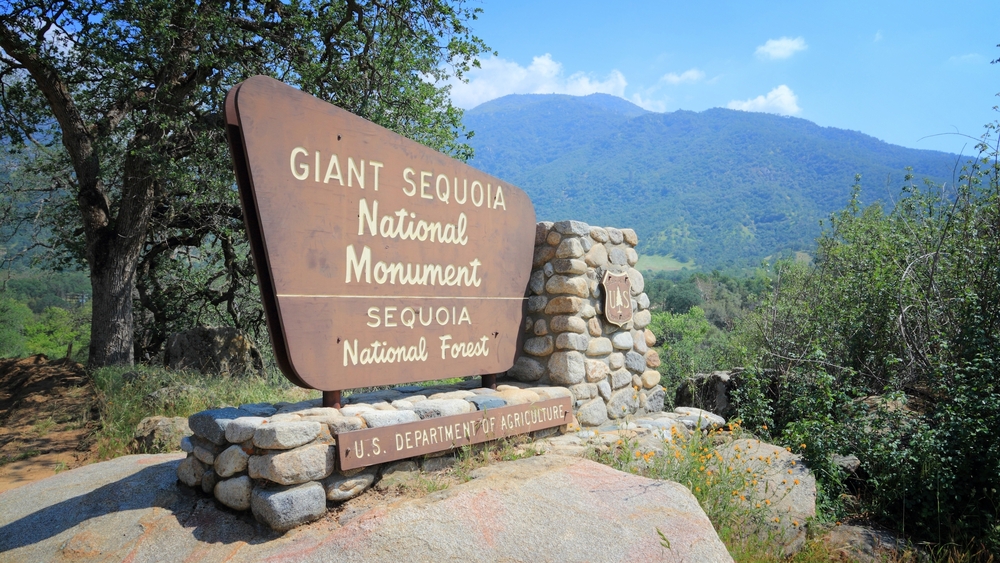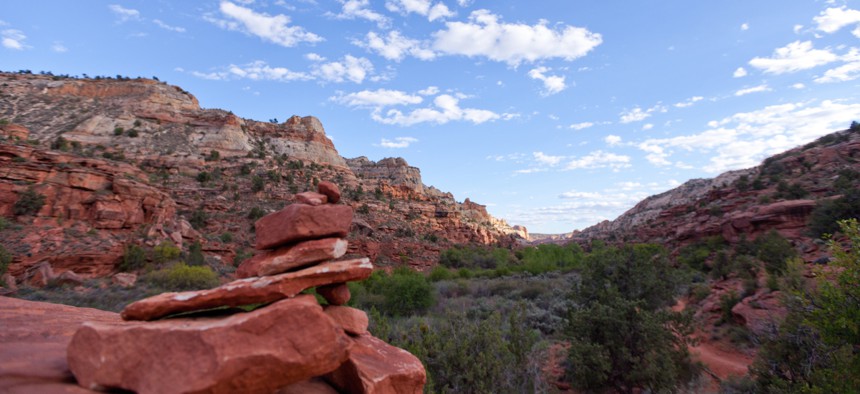Connecting state and local government leaders
Details are mostly under wraps, but the Interior secretary said no monuments would be eliminated. There could be, however, unspecified changes to a “handful.”
WASHINGTON — Interior Secretary Ryan Zinke indicated Thursday he would recommend to President Trump that changes be made to national monuments—public lands that encompass cultural sites and millions of acres of desert, forest, mountains and ocean.
But the Interior Department did not release details about which monuments might be reworked, or what the possible changes could involve. Some supporters of leaving the monuments intact were bracing for the possibility that Zinke’s proposals would call for sweeping alterations.
Trump in April ordered a review of larger-sized national monuments that previous presidents have designated over the last two decades, under a 1906 statute known as the Antiquities Act.
Zinke was responsible for overseeing the review and sent a draft report with his findings to the White House on Thursday. He told The Associated Press he would not recommend eliminating any of the 27 monuments that were reviewed, but that he would suggest changes to a “handful.”
"I very much doubt that he’s talking about a few little boundary changes here and there,” said Matt Lee-Ashley, a senior fellow at the Center for American Progress, a liberal advocacy group.
“From what we're hearing, we’re going to see a proposal to massively reduce the size of some of the most important national monuments in the west and potentially in the oceans,” he added.
Navajo Nation Council Delegate Davis Filfred is a supporter of Bears Ears National Monument, one of the more controversial monuments covered by the review.
“We respectfully asked the Trump administration and pleaded with Zinke not to bother it, just to leave it the way it is,” Filfred said of Bears Ears by phone on Thursday. “That’s still our position.”
“That’s not going to be negotiated,” he added. Filfred said the Navajo Nation was prepared for a legal fight. “We’ll do whatever we can, anything necessary, in terms of going to court.”
A spokesperson for the Interior Department did not return a phone call seeking additional information about the secretary’s recommendations.
And an email to the White House press office asking when the president might act on the recommendations included in Zinke’s report, or release a full copy of it, also went unanswered.
Interior released a two-page summary of the report. But it did not explain specifics about Zinke’s proposals.
The summary did say that no president should use the Antiquities Act “to restrict public access, prevent hunting and fishing, burden private land, or eliminate traditional land uses,” unless such action is needed to preserve objects the act aims to protect, such as landmarks and artifacts.
“Only Congress retains the authority to enact designations such as national parks, wilderness, and national conservation and recreation areas,” the summary adds.
Some Utah Republican lawmakers in Congress, and at the state level, have been especially vocal against monument designations then-President Obama made during his time in office, particularly Bears Ears, which critics have derided as an example of executive overreach.
U.S. Rep. Rob Bishop, a GOP member of Utah’s congressional delegation, applauded Trump for ordering the national monument review.
And during a conference call with reporters on Thursday he said Congress should take action to revamp the Antiquities Act, arguing that the lawmakers who passed the statute intended for it to be used to protect smaller-sized parcels of land, more in the range of about 300 to 600 acres.
“We don't need to eliminate the Antiquities Act,” he said. “We just need to go back to what it’s purpose was…we should be dealing with objects of antiquity. Not large landscape viewsheds.”
Language in the Antiquities Act says monument designations should be “confined to the smallest area compatible with proper care and management of the objects to be protected.”
Presidents, however, have long used the law to designate monuments that span across thousands of acres.
For example, Theodore Roosevelt in 1908 to set aside 808,120 acres in the Grand Canyon region. Calvin Coolidge in 1925 established a 1.3 million acre monument in Alaska’s Glacier Bay. And Herbert Hoover in 1933 designated 848,581 acres in Death Valley, located in California and Nevada.

Some of the monuments covered by the review include Grand Staircase-Escalante, which is in Utah, Giant Sequoia in California and Cascade Siskiyou in Oregon. Five of the designations under review are marine monuments, which encompass ocean waters.
Six monuments were removed from the review prior to Thursday. These included: Craters of the Moon, in Idaho; Hanford Reach, in Washington; Upper Missouri River Breaks in Montana; Grand Canyon-Parashant, in Arizona; Canyons of the Ancients, in Colorado; and Sand to Snow in California.
From a legal perspective, it’s unclear whether Trump has the authority to drastically reduce the size of an existing national monument. No past president has tried to do so.
Bishop said that interest groups criticizing the review process were blurring the lines between national monuments and other public lands designations. And he disputed that the debate about monuments hinged on a conflict between conservation and energy development.
Lee-Ashley, with Center for American Progress, said that some areas covered by the review have higher than average potential for oil and gas extraction. But he said the potential for drilling in Bears Ears is somewhat limited and would likely attract mostly speculators and “wildcatters.”
Coal interests, he added, have shown interest in parts of the 1.7 million acre Grand Staircase-Escalante monument, which was designated by then-President Bill Clinton in the 1990s.
Within the bounds of some monuments there have been concerns and tensions about other types of mining as well, and over access for cattle grazing and logging.
Bishop suggested that the process needs to be improved to gather local input before presidents make monument designations.
But, with Bears Ears, Filfred, of the Navajo Nation, believes there had been ample debate.
“We’ve been going at this for a decade, over a decade” he said.
Bears Ears includes canyons, red rock formations and pinyon-juniper forests, along with sites and artifacts that are culturally significant to Native Americans.
“We have so many sacred sites in those areas. So many. There’s many more that we don’t know about. We have so many petroglyphs,” Filfred added. “That needs to be preserved.”
Bill Lucia is a Senior Reporter for Government Executive’s Route Fifty and is based in Washington, D.C.

NEXT STORY: Northeastern States Plan Aggressive Action to Cut Greenhouse Gas Emissions




